AFI 13-SUNSET BLVD
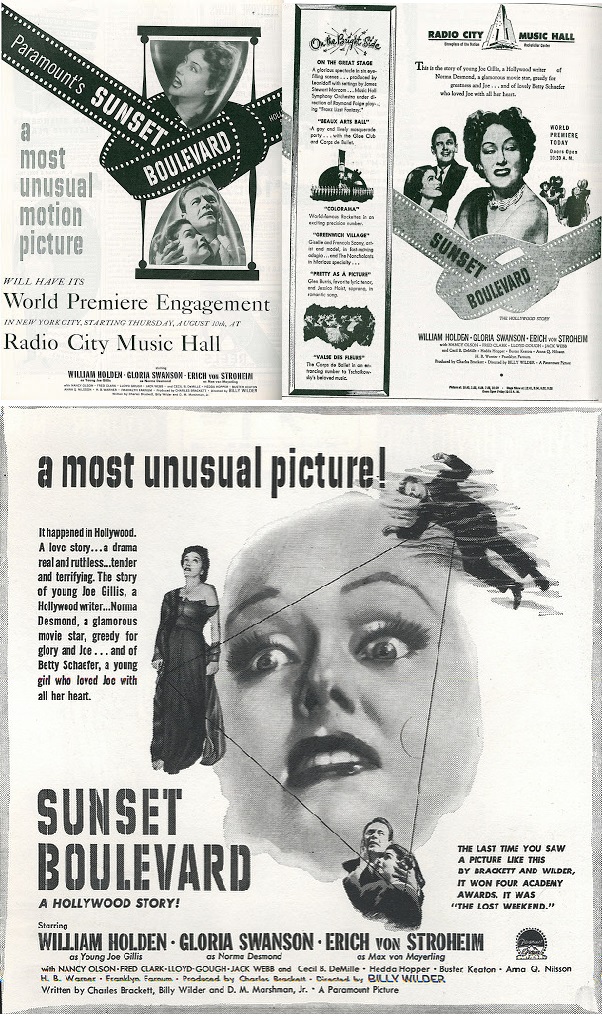
This is without question Billy Wilder’s most audacious film—with ACE IN A HOLE and SOME LIKE IT HOT coming in a close second and third.
I remember when I first saw it as if it was yesterday. That’s how great an impression the film had on me even in my early teens. It was first shown on TV on NBC’s Saturday Night At The Movies in the early 1960s. (I still have the TV-Guide close up) Frankly, with this film, commercials simply couldn’t impede appreciating the movie. To tell you the truth I simply couldn’t take my eyes off that television screen. It was a mesmerizing film experience! And mind you I didn’t know much about Hollywood and the many “inside” references in the film but that didn’t matter. SUNSET BLVD is that masterful a piece of film making. As a result, this was one of those films that whenever it was on TV I would go out of my way to watch it again and again and again. My only regret is that I have never seen it on the big screen. Of course I have watched in Blu-Ray on a big screen TV and that is a good if not perfect alternative.
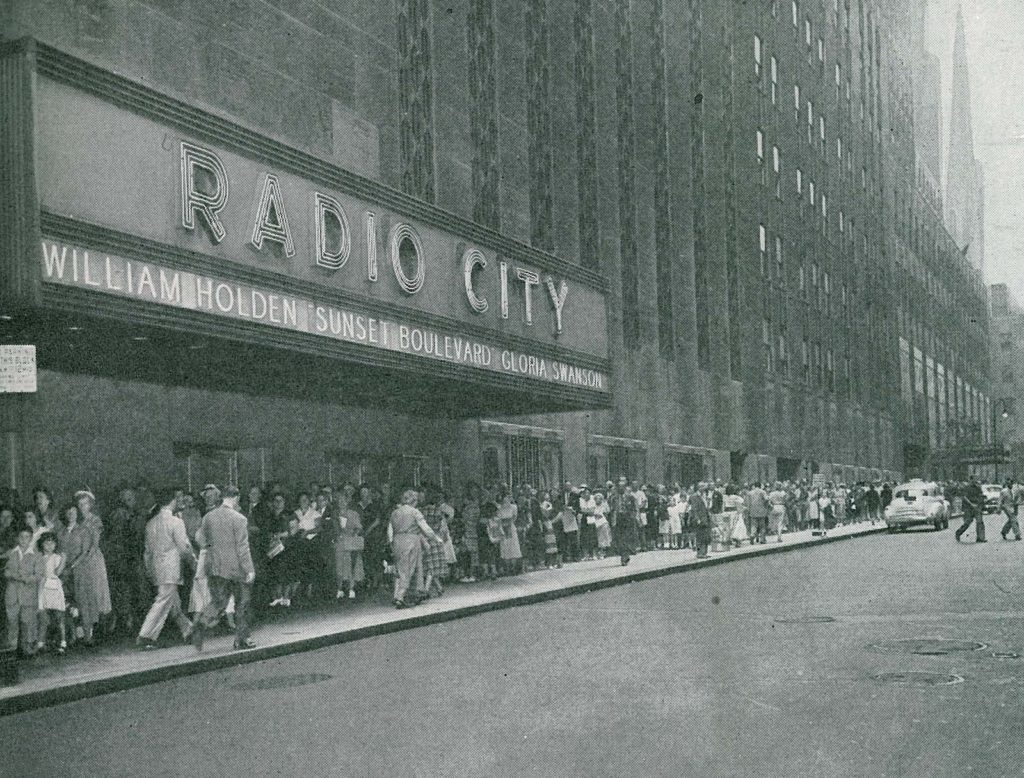
Where SINGING IN THE RAIN was a love letter to Hollywood, SUNSET BLVD is as cynical a look at the movie capital as has ever been put on the screen. It’s interesting that Wilder—first as a writer at Paramount (being a Jew having left Germany almost as soon as Hitler moved in) and then as a director had one of the most successful careers in films. Yet he writes a film about a B-movie writer on the skids who eases into a life as a “kept man.” (While living in Europe before coming to Hollywood and “breaking into the movies;” in order to eat Wilder had serviced women for money so it was territory with which he was familiar.) Consequently, it always seemed to me that Wilder, despite all his success, knew that a few too many flops and he could easily land up just like his character. The film is filled with this kind of raw, if not painful, honesty.
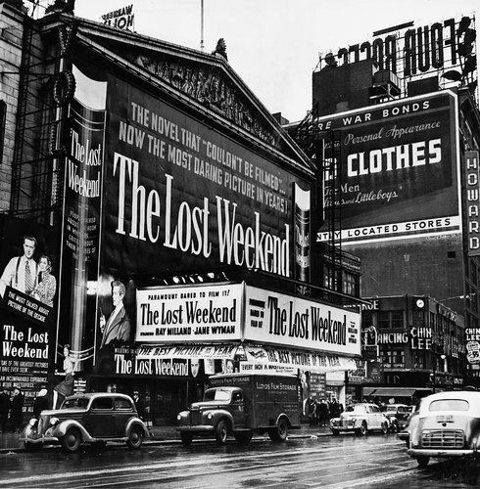
Four years after his great success with THE LOST WEEKEND, (a film Paramount had so little faith in that it shelved it for a while and then upon release it becomes one of their biggest grossers and wins a Best Picture Oscar) Billy Wilder set out to make a film about Hollywood that is so inside, so real in its mise-en-scene that for the unincited it becomes near impossible to differentiate reality from fiction. This is not a film about Hollywood; this film is Hollywood.
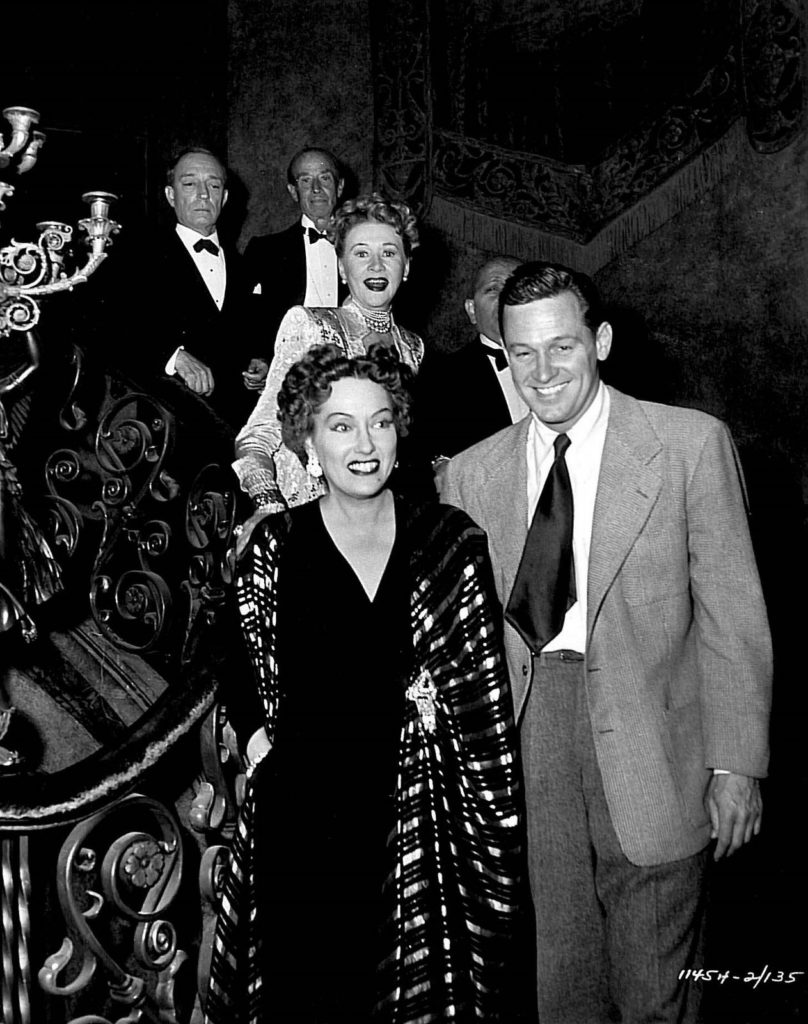
Wilder writes a film about the biggest silent star whose film career faded when sound came in, so he casts Gloria Swanson, who was the biggest star in silents whose film career faded after sound came in. He writes about her butler, and former husband, who—along with DeMille and Griffith—was one of the greatest directors in silents and, so, he casts Van Stroheim who next to DeMille and Griffith was one of the greatest director of silents. He writes about faded silent stars playing bridge with Desmond and there is faded stars Buster Keaton, Anna Q. Neilson and H.B. Warner.
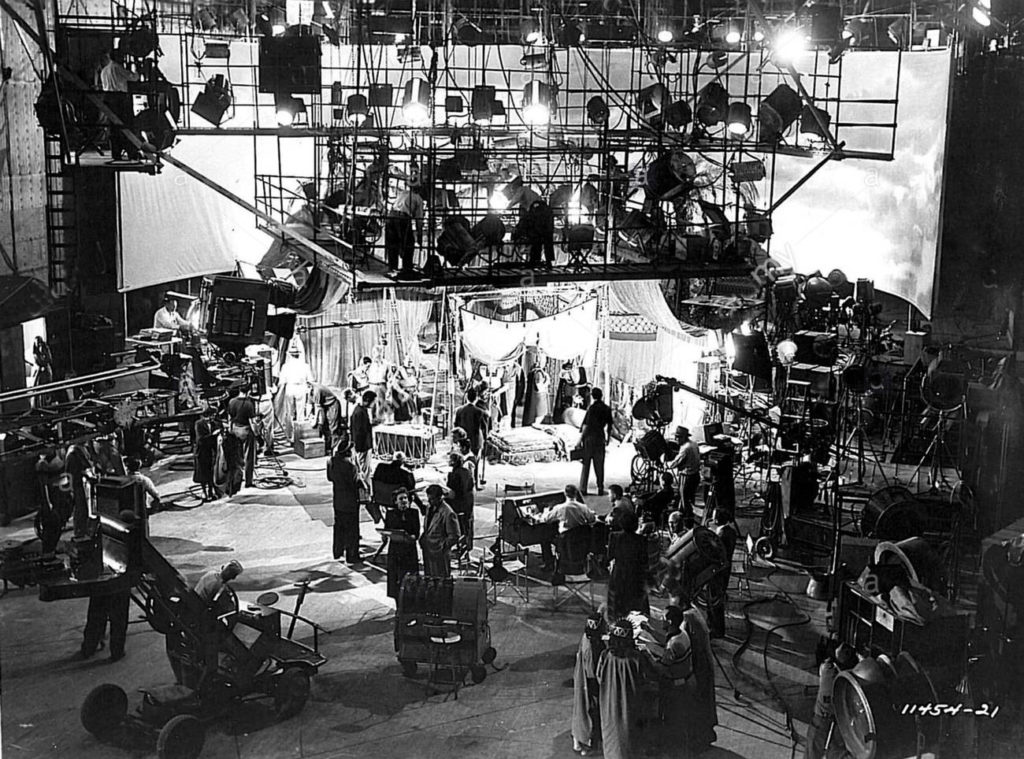
He even has Cecil B. DeMille—while directing SAMSON AND DELILAH—play himself to lend further authenticity to the film. It was DeMille who had had been the director most responsible for making Swanson a star and in the film the director most responsible for making Desmond a star. By film’s end Wilder even has gossip columnist Hedda Hopper play a Gossip columnist named—Hedda Hopper.
In addition the Hollywood in this film is no fantasy land filled with great love stories or rags-to-riches tales and a town where dreams come true. It is a tough town that will eat you up if you don’t make the grade. Yet amazingly Wilder doesn’t make anyone a villain or in any way disparage these people or present them in a negative light. What we see are people who are trying to make a living in a demanding profession. In other words Hollywood.

Gloria Swanson had been the biggest star in Hollywood. She was so big a star that Paramount could book a year’s worth of films as long as they had four or five Swanson vehicles included because theater owners knew that if they ran a Swanson film they would make enough profit to make it worthwhile booking all those other Paramount films.
In the late 20s, at the height of her stardom, she began an affair with Joseph Kennedy while he was in Hollywood creating what eventually became RKO Studios and he persuaded her to leave Paramount (where she was offered 10,000 1920s dollars a week to remain at Paramount) in order to make intendent films for United Artists where she became a partner along with Fairbanks, Pickford, Griffith and Charlie Chaplin.
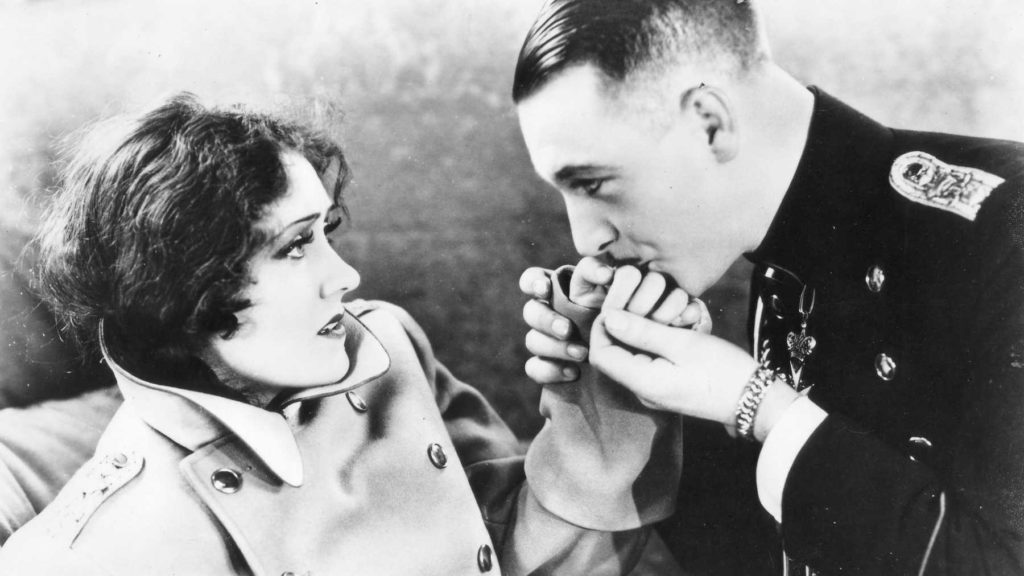
The first film she and Kennedy make is QUEEN KELLY, directed by Erich Von Stroheim when he was at the hight of his powers. (Shots from it are even used in the film.) But, as usually happened with Van Stroheim he shot and shot and shot and had only filmed the first third of the movie when they exceeded the budget. Then, once Swanson realized that the second third of the film would take place in a bordello and knowing this would never pass the censors she called a halt to the production and fired Von Stroheim. She then makes SADIE THOMSON adopted from Maugham’s RAIN and it is her greatest success as was her first sound film THE TRESPASSER. From there it was downhill.
Then, as if it was a story line element from SUNSET BLVD, Swanson’s luck ran out and her next films fail until only four years after sound came in her film career was over. As I mentioned, it could have been Norma Desmond’s story. Truth is that Swanson was no Norma Desmond as she moved into Radio and theater instead of becoming a recluse. Yet she plays Norma Desmond so convincingly that many viewers have come to believe that she was merely playing herself which couldn’t have be further from the truth.
Consequently, Gloria Swanson is nothing less than electric in this movie as she delivers a complex multi-layered performance. When I first saw the movie I didn’t know who Swanson was so I had no reference point about her except this performance and, thus, came to the Swanson legend completely fresh. And this was to my advantage because what Swanson brings to this performance is extraordinary. She plays Norma Desmond as an emotionally immature woman who, not really knowing who she is, is always acting; always “on” which makes it obvious why, when her film career ended essentially, her life was over. So she recedes into her own world stuck in the past where, with her butler’s help, Norma Desmond remains a great star if only in that white elephant of a mansion.
Having now watched a number of Swanson’s silent and early sound films watching her in Sunset Blvd truly amazes me because it becomes obvious that despite her great stardom, until SUNSET BLVD, the depth of this women’s talent had never even been tapped and her work here is probably the greatest comeback of all time. Interesting that the production had to age her for the part as Gloria Swanson didn’t look much different than she did in silent films as she was a health nut and took great care with her health and looks. No Norma Desmond there.
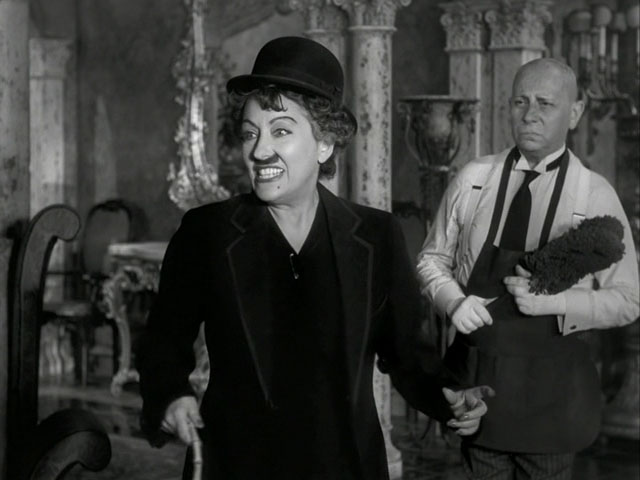
I really don’t want to go into all her great moments in the film here because, if you have seen it, you know them all. But the one that stands out and is unforgettable is her imitation of Charlie Chaplin that that is so extraordinary that I had to do re-take to realize that it is Swanson and not Chaplin. And of course that last scene in the film where a mentally unbalanced Norma Desmond descends that staircase is incredible and utterly unforgettable.
Holden had been in films for over ten years at this point had pretty much sustained a second-tier serviceable career. SUNSET BLVD changed all that as his hard edge cynical performance showed a side of him that audiences had never seen before. It and the films that followed established him as an actor of the first rank so-much-so that over the next five or so years he became one of the biggest male star in the business. There is no other word to use describing his performances but perfect. As the film is narrated by his character—while lying face down dead in a swimming pool—the cynicism with which the film is rife is obviously his and as he is a screen writer in the film he is obviously a stand-in for Wilder. Holden’s dialogue spoken as well in the narration is sharp, direct and informed. In other words, Billy Wilder at his best.
Van Stroheim is, as always with his acting, an incredible screen presence. When he is in a scene it is hard to take your eyes off of him. One can easily understand why he was such a big star in silents—usually directing himself—and there is something poignant realizing that this once great film director could, like his character in the film, no longer direct movies. This becomes ever so obvious when Stroheim comes to life in front of the Newsreel cameras directing them to photograph deranged Desmond’s iconic descent of the staircase thinking she is on a movie set playing Salome.
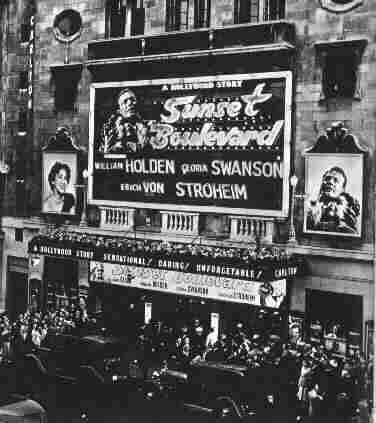
When SUNSET BLVD was initially released—financially it was a disappointment although it was nominated for 11 Academy Awards winning three including screenplay—some studio heads, especially, Louis B. Mayer dislike it’s presentation of the business which he thought was not only negative but incorrect. (Mayer’s commented about Wilder that “He makes a film that bites hand that fed him.”) Interesting, just a few years later when Mayer was fired he, like Norma Desmond, soon became a largely forgotten non-entity in Hollywood and like Desmond never made a another film again dying as tried to make his “comeback” by maneuvering to regain control of MGM. It seems that Wilder wrote better then he knew.
Wilder does attempt to infuse the film with a little optimism. There is a little love story between Holden and Nancy Olson and a look at the younger members of what was then the “New” Hollywood. But, it is all there merely to put the Desmond story into sharper relief and heighten the film’s over all cynicism.
Wilder was known—as a director and major Hollywood wit—for his brutal honesty and now that he is gone there is no better evidence of that than SUNSET BLVD. It’s a film I never grow tired of. And for good reason, as in time it even became Wilder’s story.

After a decade of flops Wilder ceased making films in the early 80s and spent the last 15 years of his life, like Norma Desmond—in Hollywood terms—a “has been.” But Wilder unlike Desmond did not retreat anywhere. He went to his office every day, gave interviews and was given all sorts of lifetime awards. Wilder’s take on all this is pure Wilder. I paraphrase. “Well, they feel sorry for the old man. He’s made some flops and they try to make him feel better by giving him these awards. What can I tell you?”
Awards he didn’t need, having made Sunset Blvd was award enough.
Hallo und vielen Dank für dieses Blog ist eine wahre Inspiration .. Twyla Gonzales LaMori